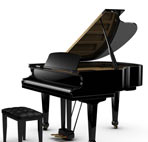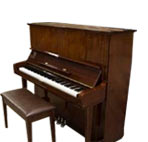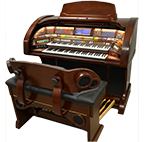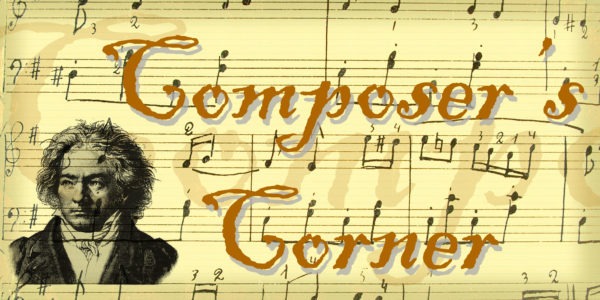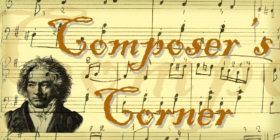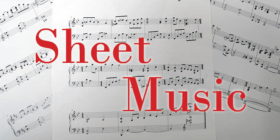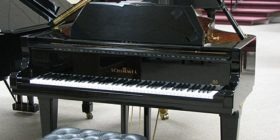Born in the city of Nürnberg in 1653, Johann Pachelbel grew up in one of the most culturally active regions of Europe.
Pachelbel’s father enrolled him in the St. Lorenz high school, but soon recognized his music potential, so he arranged for his son to receive outside musical training from two leading instructors: Heinrich Schwemmer and organist Georg Caspar Wecker.
He attended various non-music related courses at Nürnberg’s Auditorium Ægidianum. Normally, such courses were reserved for the children of the upper class, but an exception was made in his case, due to his academic abilities. These abilities further served to help Pachelbel gain entrance to the Universität Altdorf, in 1669 at the age of fifteen. In addition to his studies, he served as organist at the Pfarrkirche. Unfortunately, his father was unable to support him financially, so he was forced to withdraw.
In the spring of 1670, he enrolled in the Gymnasium Poeticum (the German equivalent of a high school, but is generally for university-bound students) in Regensburg. The school’s administration was so impressed by his scholastic achievements that they gave him a scholarship and accepted him above and beyond their normal quota of students. They also made special arrangements for him to study music outside of the gymnasium with Kaspar Prentz . Prentz introduced Pachelbel to Italian music, an experience he would not have experienced inside the Gymnasium.
Prentz left Regensburg in 1672, and soon after, in 1673, Pachelbel decided to travel to Vienna. There he was immersed in the works of Catholic composers from Italy and southern Germany. Johann Kaspar Kerll also moved to Vienna in 1673, and though Pachelbel’s music reflects various aspects of Kerll’s technique , no evidence exists that Pachelbel was ever trained directly by Kerll.
The Vienna experience affected his style in a way that would not have been possible in the Protestant region where he grew up and was educated. Styles and techniques he learned here would be carried on and experimented with throughout his career.
Composer & Performer
Pachelbel began his professional career as an organist in various locations. As was stated above, his first job was as an organist at the Pfarrkirche. When he arrived in Vienna, he quickly found employment at the Stephanskirche (Church of St. Stevens) as a deputy organist.
In 1677, he returned to Protestant Germany and settled in Eisenach, Thüringen (Thuringia). Two important events happened while we lived here. Through his appointment as court organist under Daniel Eberlin for Prince Johann Georg of Sachsen-Eisenach, he became known as not only one of the most predominant German organists, but also one of the most accomplished composers.
Also in Eisenach, one of the most important events of the Baroque period took place. Here, Pachelbel met the Bach family and soon began to tutor Johann Ambrosius’ children, including the young Johann Sebastian.
Circa 1678, the Prince of Sachsen-Eisenach died, and Pachelbel began looking for other work. He received no immediate offers, so he asked Daniel Eberlin for a testimonial addressed to any interested parties. Eberlin was happy to oblige and noted in the letter that Pachelbel was “a perfect and rare virtuoso.”
Later that year, he was invited to nearby Erfurt to be the organist at the Protestant Predigerkirche (Preacher’s Church). He remained at this post for 12 years, and during this time was married twice. He lost his first wife and son to the Plague in 1683 and remarried in 1684.
Having felt that he had spent enough time in Erfurt, Pachelbel asked to be released from his position there and in August of 1690, traveled to the southern German city of Stuttgart where he assumed the post of court organist for Duchess Magdalena Sibylla of Württemberg. His stay in Stuttgart was cut short by the threat of a French invasion so, in the fall of 1692, he return to the area of Thüringen, and this time found himself in the city of Gotha.
He served as the town organist, but due to his growing fame throughout Europe, was asked a month later to serve as an organist in Oxford, England, but rejected the offer. He was asked to return to Stuttgart, but also refused that offer.
On April 20th, 1695, his mentor Georg Caspar Wecker died, leaving vacant the organist’s post at Sebalduskirche (Church of St. Sebald) in his hometown of Nürnberg. The church authorities were so anxious to appoint him that they decided to forego the customary audition process and helped pay his moving expenses. In the spring of 1695, he officially asked to be released from his position in Gotha, and in July of that year returned home and held the position until his death on March 9th, 1706.
Educator
Though he was officially a performer and composer for most of his life, Pachelbel took time out of his busy schedule — often having to compose a new piece every week — to tutor musicians on the side. The first and most important example of this occurred in Eisenach around 1677, where he became good friends with the Bach family.
In 1680, Johann Ambrosius Bach asked Pachelbel to be the godfather of his daughter, Johanna Juditha. Six years later, he was asked to tutor the eldest son of the Bach family, Johann Christoph (a.k.a. Johann Balthasar). During his visits, he also taught some of J.A. Bach’s other children, including a young Johann Sebastian Bach.
In the years of 1693 and 1694, the Bach family was devastated by death. First J.A. Bach’s twin brother, Johann Christoph Bach died. A short time later, J.A. Bach’s wife, Elisabetha died, which devastated J.A. Bach, who in turn, died ten months later. This left the family shattered, and Johann Sebastian was sent to live with a cousin; however, this cousin had financial difficulties and sent Johann Sebastian to live with his brother Johann Christoph in Ohrdruf who trained him using techniques taught to him by Pachelbel.
One interesting story comes from his time in Ohrdruf. For some unknown reason, Johann Christoph forbid J.S. from reading a manuscript of Pachelbel’s original works. Every night for six months, Bach would sneak down to his brother’s study and copy the manuscript by moonlight for his own use. So Pachelbel influenced Johann Sebastian’s music both directly and indirectly. For this reason, he is referred to as the “geistige Stammvater Bach” or the intellectual progenitor of Bach.
As he moved from various locations, he always took time to tutor students. This is especially evident during his times in Erfurt and his later years in Nürnberg. He also tutored all of his children. His son William Hieronymus filled Pachelbel’s position at Sebalduskirche, shortly after his death. His other two sons, Carl Theodor & Johann Michael immigrated to America around 1730.
While in America Carl Theodor made a bit of history. Following in his father’s footsteps he found employment as an organist at the Trinity Church in Newport, Rhode Island sometime around 1733. In 1736, he traveled to New York City and at 6:00 PM on January 21, 1736 gave a concert in a local tavern. This event is significant as it was the first concert in the colonies of which records exist. Thus, Pachelbel’s influence was not only limited to the European continent, but spread across the ocean to America.


